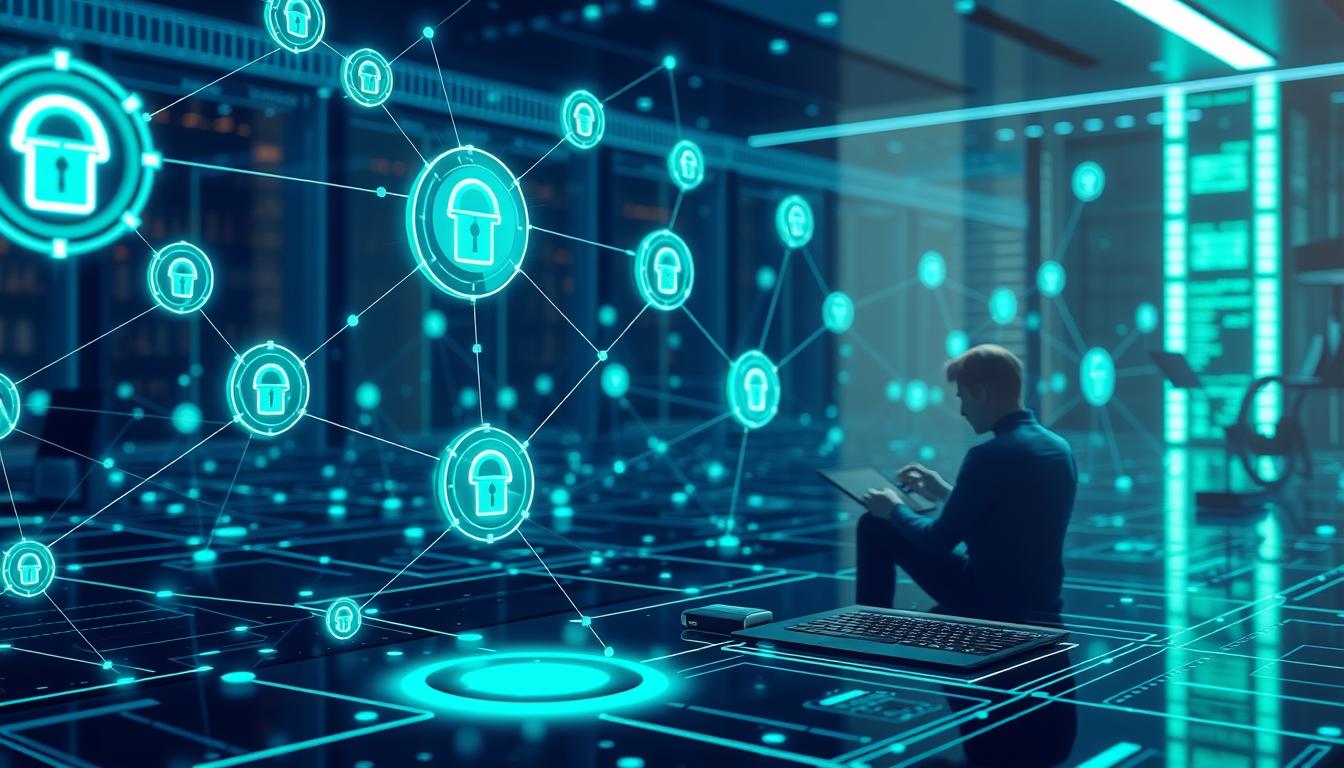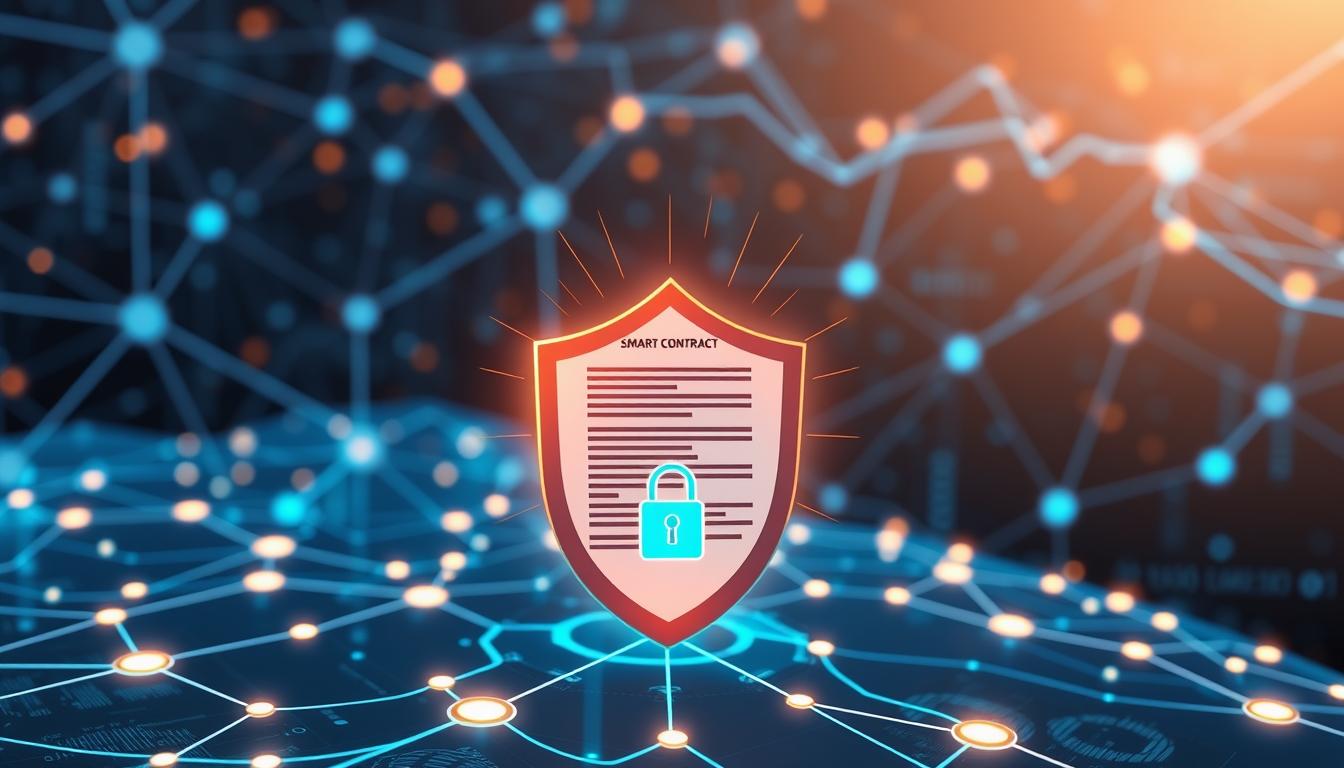Last Updated on December 9, 2025
Remote work’s rise in popularity has highlighted the need for secure remote work with blockchain solutions. This shift brings benefits like convenience and flexibility but also risks like data breaches and identity theft. Blockchain technology offers a beacon of hope, providing a way to maintain the integrity and security of remote operations. It leverages blockchain’s decentralized and transparent nature to create a secure environment for managing sensitive information.
Blockchain’s immutable ledger and encrypted data blocks ensure records are tamper-resistant and protected. This security over identity and data safeguards against breaches, enhancing your organization’s reputation with verifiable records. While not a complete solution, blockchain significantly improves identity, data, and reputation security. When paired with smart contracts, it forms a robust cybersecurity framework for remote workforces.
Key Takeaways
- Blockchain technology enhances security in remote work environments.
- It safeguards sensitive data through encryption and decentralized storage.
- Immutable records help establish trust and transparency.
- Blockchain assists in secure identity verification without exposing sensitive information.
- Smart contracts automate processes, adding an extra layer of security.
- Decentralization helps protect against cybersecurity threats.
The Rise of Remote Work in a Digital Age
The digital age has profoundly changed how we work, leading to a remote work revolution. Over one billion people now work from home, forcing companies to rethink their digital workspace security. The Yahoo hack, which exposed more than a billion user accounts, underscores the risks of remote work.
Trust is now a major concern as face-to-face interactions move online. The Paris fraud case, where impersonators swindled the wealthy, shows the dangers of remote interactions. As remote work grows, finding secure communication solutions is essential. Blockchain technology is seen as a key to blockchain secure communication.
Blockchain is also transforming decision-making processes. Initiatives like CommitCoin and BitCongress enable secure voting from anywhere. These projects show blockchain’s potential to increase trust and integrity in remote processes. The need for blockchain developers is increasing, highlighting the industry’s growing demand for such solutions.
Success in remote work goes beyond technology; it requires careful communication protocols and routines. In-house teams benefit from face-to-face interactions, while remote teams use digital tools. This shift not only boosts flexibility and cost-efficiency but also emphasizes the importance of data security.

Understanding Blockchain Technology
Blockchain technology is transforming how we handle and protect digital information. It functions as a decentralized ledger across a network of computers. This setup ensures all participants have access to the same information, boosting trust and security.

Since its debut in 2009 with Bitcoin, blockchain has expanded beyond digital currency. It can securely record votes, manage inventory, and protect identity documents. The secure blockchain technology features, like cryptographic signatures, prevent fraud. This makes transactions secure and tamper-proof.
Decentralization is key to blockchain’s functionality. It spreads decision-making power among many nodes, preventing any single entity from dominating. As more people and businesses use blockchain, its benefits become clearer. It improves transaction accuracy and enhances transparency, showing its potential in various fields.
Learning about blockchain basics also means understanding its programmability. Smart contracts automate actions based on set conditions, enhancing efficiency. The permanent record of transactions ensures security and trust, making blockchain a valuable tool in today’s digital landscape.
Blockchain Secure Work: Enhancing Data Integrity
In the world of secure remote work, blockchain technology stands out as a key player in boosting data integrity. It leverages decentralized networks to reduce risks from single points of failure. This approach keeps data private, protecting sensitive information from unauthorized access and tampering.
Decentralization and Its Impact on Security
Decentralized networks are pivotal in enhancing security. Data is spread across many nodes, creating a strong system against breaches. This makes it harder for cyberattacks or unauthorized data changes to succeed. It supports data privacy and allows transparent access for those who should have it.
Immutable Ledger: Trust Without a Middleman
Blockchain’s immutable ledger is a standout feature. Once a transaction is logged, it can’t be altered or deleted. This boosts data integrity and builds trust among users. It makes verifying data easy, ensuring records are accurate and reliable. The transparent logs also streamline audits, making verification quicker and more reliable.
Key Blockchain Security Measures for Remote Work
Remote work’s rise makes data integrity more critical than ever. Adopting blockchain security measures can secure data on blockchain and lower risks. This part covers vital strategies for a secure remote work setup.
End-to-End Encryption for Data Protection
End-to-end encryption is key in blockchain security. It keeps data safe during transmission, cutting down hacker risks. Strong encryption ensures sensitive info stays private, accessible only to those who should see it. The Gartner prediction of 60% of companies using encryption by 2024 shows the importance of solid security.
Multi-Factor Authentication: A Layer of Protection
MFA boosts your remote work security. It demands multiple verifications for data access, improving cybersecurity. Combining a password with a mobile device adds a strong defense against unauthorized access. This approach strengthens your system’s security and builds trust among team members.
Ensuring Secure Communication Through Blockchain
In today’s remote work environment, effective communication is crucial. Blockchain technology offers unique solutions to enhance secure communication among teams. By harnessing secure messaging platforms that integrate blockchain, organizations can ensure confidentiality and integrity in their transactions.
The decentralized architecture of blockchain secure communication significantly reduces cyberattack potential. This provides a robust safeguard against data breaches. With advanced encryption protocols, these platforms protect sensitive information from unauthorized access. This makes them an ideal choice for organizations that prioritize data security.
Utilizing such technology allows teams to communicate over encrypted channels. This minimizes the risk of message interception or tampering. The U.S. Department of Defense (DoD) is actively exploring blockchain for secure communication channels. The DoD’s 2023 Cybersecurity Strategy Report highlights the critical importance of maintaining data integrity while communicating across systems.
Moreover, global defense spending on blockchain solutions has seen a notable increase of 25% in the past year. Projections indicate a continued growth rate of 30% annually over the next five years. This surge underscores the importance of adopting innovative technologies to protect sensitive information in both military and civilian applications.
As organizations increasingly turn to secure messaging platforms based on blockchain, a new standard for secure communication emerges. These platforms promote an environment where trust is inherent, and data integrity is uncompromised. This enables improved collaboration across remote teams.
The exploration of blockchain for secure communications is evident in various sectors, including healthcare. It is used for real-time auditing and ensures accountability. Blockchain solutions offer organizations a powerful resource for securing their communication and protecting sensitive information that fuels their operations.
The Role of Smart Contracts in Secure Remote Transactions
Smart contracts have revolutionized various sectors, offering a secure solution for remote transactions. They enable self-executing agreements on the blockchain, eliminating intermediaries. This streamlines processes, building trust. Smart contracts enhance efficiency and empower businesses to automate transactions, reducing errors.
How Smart Contracts Automate Trust
Smart contracts automate transactions, creating a trustless environment vital for remote work. They execute automatically when conditions are met, ensuring obligations are fulfilled. This leads to increased transparency, lower costs, and reduced risks. It’s crucial for sectors like finance, property, and supply chain management.
Avoiding Vulnerabilities: The Importance of Audits
Smart contracts come with challenges, including coding errors and scalability issues. Thorough audits are necessary to identify and fix vulnerabilities. Regular assessments boost confidence in smart contracts security, ensuring smooth transactions. This proactive auditing is key to maintaining a secure environment for remote transactions.

Limitations of Traditional Security Protocols
Traditional security protocols have their strengths but also significant weaknesses. They often rely on centralized models, which can be vulnerable to cyberattacks. In 2020, data breaches averaged $3.86 million, highlighting these traditional security flaws.
Companies with centralized infrastructures have faced millions of attacks, showing the urgent need for change. Edge devices like mobile phones and routers are now prime targets for hackers. As remote work grows, protecting sensitive data becomes a top priority for companies.
Public blockchain networks, though promising, are not without threats. Phishing and routing attacks can still occur, and vulnerabilities exist. Therefore, developing resilient frameworks that address these gaps is crucial. Moving towards decentralized systems could help mitigate risks from ransomware and large data breaches.
Adopting blockchain technology is a proactive step in securing remote operations. The growing preference for decentralized models shows a recognition of traditional methods’ limitations. Organizations are now aware that adapting to modern threats is vital for digital security.
Blockchain Network Security: Protecting Against Cyber Threats
Remote work’s rise has heightened the need for advanced cybersecurity. Organizations face significant cyber threats, requiring strong defense strategies. Blockchain network security stands out as a key solution. It leverages decentralization to reduce the risk of unauthorized access. This architecture secures sensitive data, making it crucial for data protection.
Cyberattacks on blockchain networks, like 51% attacks and phishing, highlight the need for strict cybersecurity. Implementing identity and access management, along with robust governance, is essential. Private blockchains offer a controlled environment, effective in reducing risks while maintaining efficiency.
Blockchain’s security is bolstered by cryptographic hash functions, such as SHA-256. These functions enable quick detection of data changes, ensuring data integrity and strong encryption. This combination strengthens an organization’s cybersecurity posture.
Consensus mechanisms like Proof of Work (PoW) and Proof of Stake (PoS) validate transactions, preventing fraud. These processes make blockchain a vital tool in combating cybercrime. More organizations are seeing the value of blockchain in enhancing data security and safeguarding assets.
Future Implications of Blockchain in Remote Work
The evolution of remote work is underway, with blockchain technology at its forefront. Companies adopting blockchain secure workforce solutions will reap significant benefits. A decentralized system boosts security and trust, essential in today’s digital world. Blockchain’s transparent nature streamlines processes, cutting down fraud and speeding up transactions.
This shift has profound effects on remote work. Blockchain secures digital identities and empowers individuals to control their data. It helps companies meet data protection regulations, making the workplace safer. With blockchain, hiring becomes more efficient, with candidate verification being fast and trustworthy, reducing fraud risks.
Blockchain’s potential in healthcare and education is vast. It can protect sensitive information, ensuring integrity and efficiency. This adaptability makes a blockchain secure workforce a competitive advantage for organizations.
Exploring blockchain’s role in remote work reveals its ability to drive innovation, cut costs, and build trust. Your organization can benefit from these advancements, creating a more resilient and efficient digital workspace.
Conclusion
Adopting blockchain for remote work opens up new avenues for businesses aiming to boost security and efficiency. This technology allows for better secure data management, ensuring data remains intact and protected. It introduces automated trust and transparent transactions, challenging outdated remote work methods.
Blockchain integration in remote settings empowers companies to tackle challenges head-on. Its applications span various sectors, from finance to healthcare and supply chain management. Exploring blockchain can enhance data protection and streamline operations, driving innovation in teamwork.
The future of remote work is inextricably linked with blockchain solutions. These advancements are crucial for countering cyber threats. By embracing these technologies, your organization is poised for a more secure, efficient, and productive future.








